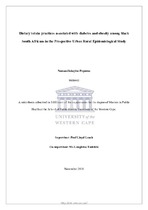Dietary intake practices associated with diabetes and obesity among black South Africans in the Prospective Urban Rural Epidemiological study
Abstract
South Africa is undergoing epidemiological transition characterised by large shifts in dietary patterns. Modern societies seem to have adopted a ―Western diet‖ which is high in saturated fats, sugar, salt, refined foods and low in fibre. Poor dietary intake practices are closely linked to the development of non-communicable diseases (NCDs), which are the leading causes of death globally. Among the prevalent NCDs is diabetes, which is closely associated with obesity. South Africa is not spared the widespread increase in diabetes and obesity, in both rural and urban settings.
Aim: The aim of this study is to investigate the prevalence and the risk factors of diabetes and obesity, with special focus on dietary intake practices, among black urban South Africans residing in Cape Town, Western Cape, and black rural South Africans residing in Mount Frere, Eastern Cape.
Methods: A quantitative, cross-sectional descriptive study design was utilised which involved the analysis of baseline data collected in 2009 and 2010 from the Cape Town cohort of the Prospective Urban and Rural Epidemiological (PURE) study. The study included a total of 2038 black South Africans, men and women, rural and urban, who were from the ages 35 to70 years. The PURE adult questionnaire was used to collect socio-demographic, anthropometric and medical history data. Dietary intake data was also collected using a standardised food frequency questionnaire from the PURE study. Data analysis was done using SPSS (version 25.0) and Stata (version 14.0) statistical programmes. Data on nutrient intake was summarised as means and standard deviations. Pearson correlation and multivariate regression analysis were performed to assess the relationship between dietary intake practices, diabetes, and obesity, and to predict risk.

